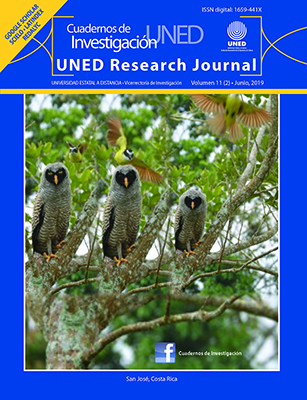The monkey Cebus imitator (Primates: Cebidae) feeds on fruits of Hedyosmum mexicanum (Chloranthaceae) in the highlands of Costa Rica”
DOI:
https://doi.org/10.22458/urj.v11i2.2306Keywords:
Cebus imitator, Cebidae, white-faced monkey, feeding, Hedyosmum mexicanum, Costa Rica.Abstract
In neotropical forests, the feeding habits of the white-faced monkey are widely known. However, little information is available regarding their diet and behavior in high-elevation tropical forests. Here I document (by photos) the consumption of the fruit of Hedyosmum mexicanum by a troop of Cebus imitator, on the slopes of Barva Volcano, Costa Rica, 2 625m above sea level.
References
Carrillo, E., Wong, G., & Sáenz, J. (2002). Mamíferos de Costa Rica. Santo Domingo, Heredia, Costa Rica: Instituto Nacional de Biodiversidad (INBio).
Chinchilla, M., Guerrero, O., Gutiérrez, G., Sánchez, R., & Idalia, B. (2007). Parásitos en monos carablanca Cebus capucinus (Primates: Cebidae) de Costa Rica. Parasitología latinoamericana, 62(3-4), 170-175. DOI: 10.4067/S0717-77122007000200011
Crofoot, L., & Tórrez, L. (2013). Cebus capucinus, ¿Por qué usan poco las zonas compartidas? Instituto Smithsonian de Investigaciones Tropicales, 8, 169-177.
Fedigan, L.M. (1990). Vertebrate predators in Cebus capucinus: meat eating a neotropical monkey. Folia Primatologica, 54(3-4),196-205. DOI: 10.1159/000156444
Fedigan, L., Fedigan, L., & Chapman, C. (1985). A census of Alouatta palliata and Cebus capucinus monkeys in Santa Rosa National Park, Costa Rica. Brenesia, 23, 309-322.
Freese, C. (1977). Food habits of white-faced Capuchins Cebus capucinus I. (Primates:Cebidae) in Santa Rosa National Park, Costa Rica. Brenesia, 10/11, 43-56.
Madrigal, L., & Gonzáles, R. (Eds.). (2016). Introducción a la antropología biológica. Estados Unidos: Asociación Latinoamericana de Antropología Biológica.
Rodríguez, B., Ramírez, J., Villalobos, D., & Sánchez, R. (2014). Actualización de la lista de especies de mamíferos vivientes de Costa Rica. Mastozoología Neotropical, 21(2), 275-289.
Sáenz, J., & Sáenz, P. (2008). Influencia de las variables de hábitat y paisaje. Sobre la presencia-ausencia del mono tití y del mono carablanca en un área fragmentada del pacífico central, de Costa Rica. En J. Sáenz & C. Harvey (Eds.), Evaluación y conservación de biodiversidad en paisajes fragmentados de Mesoamérica (pp. 511-545). Santo Domingo de Heredia, Costa Rica: Instituto Nacional de Biodiversidad (INBio).
Wainwright, M. (2007). The mammals of Costa Rica a natural history and field guide. New York, USA: Zona Tropical.
Wehncke, E., Hubbell, P., Fosters, B., & Dalling, W. (2003). Seed dispersal patterns produced by white-faced monkeys: implications for the dispersal limitation of neotropical tree species. Journal of Ecology, 91(4), 677-685. DOI: 10.1046/j.1365-2745.2003.00798.x
Published
How to Cite
Issue
Section
License
Note: This abstract contains an incorrect copyright due to technical issues. Authors who publish with this journal agree to the following terms: Authors retain copyright and grant the journal right of first publication with the work simultaneously licensed under a Creative Commons Attribution License that allows others to share the work with an acknowledgement of the work's authorship and initial publication in this journal
All journal contents are freely available through a CC BY 4.0 license.
CC BY 4.0 is a Creative Commons: you can copy, modify, distribute, and perform, even for commercial reasons, without asking permission, if you give appropriate credit.
Contents can be reproduced if the source and copyright are acknowledged according to the Open Access license CC BY 4.0. Self-storage in preprint servers and repositories is allowed for all versions. We encourage authors to publish raw data and data logs in public repositories and to include the links with all drafts so that reviewers and readers can consult them at any time.
The journal is financed by public funds via Universidad Estatal a Distancia and editorial independence and ethical compliance are guaranteed by the Board of Editors, UNED. We do not publish paid ads or receive funds from companies.
